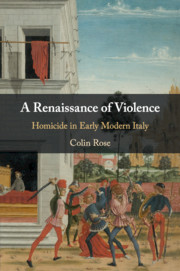‘Deftly melding new quantitative data with rich qualitative materials, this book adds a little explored ‘southern' dimension to debates about how violence declined in modernizing European societies. Alert to the political, institutional, social, and gendered particularities of early modern Bologna, Rose smartly challenges the optimistic hypothesis that homicide readily succumbed to the progress of ‘civilization'.'
Elizabeth S. Cohen - York University, Toronto
‘In this in-depth analysis of homicide cases that followed the catastrophic plague and misery of 1630, Rose unravels the cultural and political fabric of an intractable Bolognese nobility, shedding important light on how local elites resisted the centralizing and pacifying attempts of an early modern state.'
Joanne M. Ferraro - San Diego State University and author of Venice: History of the Floating City
‘With archival precision and narrative skill, Rose reveals a society in crisis and those who make killing a strategy for living. Plague, famine, and violence unravel an ineffective and illegitimate government, and trigger civil war as the Bolognese seek their own solutions with knives and guns.'
Nicholas Terpstra - University of Toronto
‘Colin Rose's compelling analysis of seventeenth-century Bologna shows how easily a peaceful society can degenerate into a society of murderers. This marvellous book erodes the notion that modern Western societies are on a trajectory toward ever less personal violence.'
Edward Muir - Northwestern University, Illinois
'… a riveting contribution to the historiography on interpersonal violence in the early modern world… This book is a highly recommended read for anyone interested in the history Italy, violence and peace-making, and the relationship between people and criminal courts in the early modern world.'
Sanne Muurling
Source: Crime, History & Societies
'… an excellent orientation for those beginning the study of interpersonal violence … specialists will appreciate this decisive contribution to the debate on the decline of violence. Rose shows how civilization and violence, far from being mutually exclusive, work together.'
Umberto Cecchinato
Source: Annali Recensioni Online
‘… contributes to a broader understanding of the role violence played in ancien-regime European society.’
Yaakov Andrea Lattes
Source: H-net
'… Renaissance of Violence is not only an excellent study of homicidal violence, but also a useful model for future studies in the field …'
Peter Sposato
Source: Criminal Law and Criminal Justice Books (Rutgers)
The book offers fascinating glimpses of gendered dimensions of homicide, emphasizing that the vast majority of murders resulted from male-on-male violence … contributes exciting new findings on violence and peacemaking by focusing on the papal government’s attempts to limit civil violence and prevent revenge killings in Bologna.'
Brian Sandberg
Source: H-Net
‘… an interesting and useful study.’
Trevor Dean
Source: Journal of Modern History



